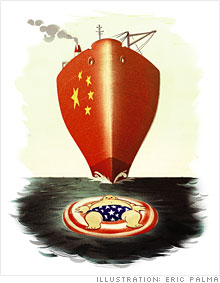 So I am a former subscriber of Business 2.0, the best magazine EVAR!!1 However, the owners gave it an unceremonious end, and all subscribers got Fortune Magazine instead. Well, an article in the last issue sort of caught my attention. Since I have been learning Mandarin for the last few months, it seems that, perhaps, more people might look into it. Here is the article in its entirety. - Travis
So I am a former subscriber of Business 2.0, the best magazine EVAR!!1 However, the owners gave it an unceremonious end, and all subscribers got Fortune Magazine instead. Well, an article in the last issue sort of caught my attention. Since I have been learning Mandarin for the last few months, it seems that, perhaps, more people might look into it. Here is the article in its entirety. - Travis
By Geoff Colvin, senior editor at large
Back in 2001 when the International Olympic Committee chose Beijing as the site of this summer’s games, the event was meant to mark China’s debut as a player on the global economic stage. But a recent study by the economist Angus Maddison projects that China will become the world’s dominant economic superpower much sooner than expected - not in 2050, but in 2015.
While short-term investors are already cashing in on China’s growth by playing the global commodities boom, smart long-term thinkers are contemplating what happens when China matures from an exporter of cheap goods to a competitor in sectors where the U.S. is dominant - technology, brand building, finance. China has almost wiped U.S. makers of low-value items like toys and socks, but by 2015 it may threaten Apple (AAPL, Fortune 500), J.P. Morgan Chase (JPM, Fortune 500), and Procter & Gamble (PG, Fortune 500). It will increasingly influence the S&P 500 and the mutual funds in our 401(k)s. So it’s worth looking at how that will happen, what it means, and what anyone can do in the seven years before the baton is passed.
Just using the exchange rate to convert China’s GDP into dollars isn’t helpful in comparing the two economies, because China controls its exchange rate; by that method, China’s economy might not pass America’s for decades. Exchange rates apply only to tradable products and services; they aren’t very useful in valuing nontradable goods in a country like China that is much poorer than the United States. So we need some way to compare the real value of China’s economic output with America’s, and economists have developed one. It is called purchasing power parity.
For example, Chinese construction workers earn a whole lot less than Americans do, yet they can still build top-quality buildings. If we used the exchange rate, the value of a new skyscraper in Shanghai would count much less toward China’s GDP than an identical building in Chicago would count toward America’s, which makes no sense. Purchasing power parity corrects the problem.
Will China take the crown?
Angus Maddison’s forecast (which uses purchasing power parity) isn’t built on outlandish assumptions. He assumes China’s growth will slow way down year by year, and America’s will average about 2.6% annually, which seems reasonable. But because China has grown so stupendously during the past decade, it should still be able to take the crown in just seven more years.
If that happens, America will close out a 125-year run as the No. 1 economy. We assumed the title in 1890 from - guess who. Britain? France? No. The world’s largest economy until 1890 was China’s. That’s why Maddison says he expects China to “resume its natural role as the world’s largest economy by 2015.” That scenario makes sense.
China was the largest economy for centuries because everyone had the same type of economy - subsistence - and so the country with the most people would be economically biggest. Then the Industrial Revolution sent the West on a more prosperous path. Now the world is returning to a common economy, this time technology- and information-based, so once again population triumphs.
So how should we make the most of our seven-year grace period? For companies: Focus on getting better at your highest-value activities. Just because the Chinese will be fighting you in the same industries doesn’t mean you’ll lose. (Investors, remember that China bought $3 billion of Blackstone (BX) at the IPO price of $31 last summer, and the firm is now trading at $19.) It only means you’ll have to work harder to win.
For individuals: You can avoid competition with Chinese workers by doing place-based work, which ranges in value from highly skilled (emergency-room surgery) to menial (pouring concrete). But the many people who do information-based work, which is most subject to competition, will have to get dramatically better to be worth what they cost. For government leaders: Improve U.S. education above all.
Those are the issues in China’s becoming No. 1 that we most need to focus on. And as with so much else in China’s recent history, we’ll need to worry about them much sooner than we expected.
![]() Tweet This Post
Tweet This Post ![]() Digg This Post
Digg This Post ![]() Stumble This Post
Stumble This Post
{ 1 comment… read it below or add one }
This has been forecasted in some works of fiction.
Take Firefly, the sci-fi series by Joss Whedon, that was short-lived.
A fascinating aspect of the culture in that show was how much chinese influence was pervasive in language, food, fashion and even custom.
Now that China’s starting (underscore _starting_ ) to open, you can expect not just chinese business and money taking over the world, but also the culture. This is not unlike the americanization that took place in almost all of the Western worlds in the 20th century